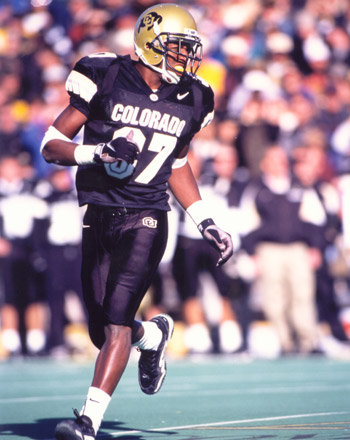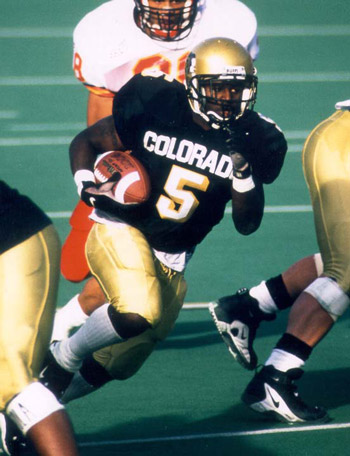



 Welcome
To Classic
CU
Welcome
To Classic
CU
Classic CU is a part of the CUBuffs.com network. Brought to you by the University of Colorado Athletic Department and the Univeristy of Colorado Heritage Center, ClassicCU.com will feature top teams, players and athletes, and events and moments from CU's rich tradition of excellence.
CU Rains Down On Oregon
 |
|
Marcus Washington was the 1996 Cotton Bowl's most valuable defensive player after scoring on a 95-yard interception return. |
Story by B.G. Brooks
Rocky Mountain News
(January 2, 1996)
DALLAS -- Colorado won in a walk, a duck walk.
Weathering the elements and discovering a cure for Oregon’s “Gang Green” defense, the No. 7 Buffs smothered the No. 12 Ducks 38-6 Monday in the 60th Cotton Bowl.
The Buffs punctuated Rick Neuheisel’s first season as CU’s head coach with a 10-2 record, making him the school’s most successful rookie coach and the first to drive the Buffs into postseason play. His first CU team likely will finish in the national Top Five when the final polls are released Wednesday morning.
“I told my players we are deep in the heart of Texas, and they are going to find out how deep the heart of the Colorado Buffaloes is,” Neuheisel said.
It took heart and a strong constitution to withstand Oregon’s hot start and playing conditions deteriorated as the game progressed. As the Ducks were taking a 6-0 first-quarter lead on a pair of field goals by Joshua Smith, a freshman walk-on from Colorado Springs, temperatures were slinking into the upper 30’s and a cold drizzle was falling.
If they were supposed to feel at home, these Ducks weren’t informed. After Smith’s pair of kicks, Oregon’s next best scoring threat didn’t occur until the game’s final play, when reserve quarterback R.P. Smith threw incomplete into the end zone from the Buffs 9-yard line.
CU held Oregon to its lowest point total since a 21-7 loss to Washington State on Oct. 8, 1994.
The Ducks (9-3) lost their fourth consecutive bowl game and were denied the school’s first 10-win season. The Buffs, meanwhile, punched up their fourth 10-win season and won a school record third straight postseason game.
CU defensive back Marcus Washington, who returned a second-quarter interception 95 yards for a touchdown, was selected as the game’s most valuable defensive player. Washington’s return swung the game’s momentum to the Buffs, halting a drive that might have given the Ducks the lead. Instead, CU took a 13-6 second-quarter lead.
CU tailback Herchell Troutman, who shredded the Ducks for 100 yards rushing and one touchdown, was the most valuable offensive player. His 55-yard run on the second play of the second half was as instrumental as Washington’s theft. It enabled CU to take a 20-6 advantage, then turn over the game to a Buffs defense that played one of its most complete games. The Ducks suffered five turnovers.
“We were sluggish in the first half from an offensive standpoint, but the defense found a way to keep us in the game,” Neuheisel said. “We came into the second half and really took control. From an X’s and O’s standpoint, the defense really dominated the game.”
It was supposed to be Oregon’s “Gang Green” defense that dominated the day. It entered the game ranked eighth in rushing defense, allowing 105.7 yards a game. But CU rushed for 170 and passed for 143 - despite the cold, blustery conditions.
“It was probably the toughest day I had,” Buffs quarterback John Hessler said. “In the second half, I really had trouble gripping the ball and throwing it. It was wet and seemed flat.”
Still, Hessler completed 11 of 26 passes for 115 yards, including touchdown passes to Phil Savoy (12 yards) and Matt Lepsis (2 yards). Hessler was intercepted twice, and the Buffs lost one of two fumbles. CU’s only other pass completion was by punter Andy Mitchell, who threw for a 28-yard gain that almost matched his 28.5-yard punting average (four attempts).
Mitchell’s pass out of punt formation came in the fourth quarter with CU holding a comfortable 32-6 lead. Oregon’s fans, players and coaches weren’t warmed by that CU strategy or the 5-yard TD run that followed on a bootleg by backup quarterback Ayyub Abdul-Rahmaan.
Asked about the fake punt, Ducks coach Mike Bellotti first offered, “No comment,” then later added, “That’s good coaching.”
Added tight end Josh Wilcox: “I think coach Neuheisel has a new song he ought to sing, and that’s Respect. It (ticked) us off. There’s a lot of things I’d like to say...”
Neuheisel said the play was called because Oregon was set to rush 10 men and CU risked its sixth blocked punt of the season. He apologized “if there were some hurt feelings toward the end of the game. The Oregon fans and players are a first-class operation.”
Bellotti called Washington’s interception the turning point. The Ducks faced second-and-goal, then faced a seven point deficit.
“It went the other way and it was a two touchdown swing,” Bellotti said. “The momentum of it was very tough on us...We didn’t take advantage of our domination of the first half and a couple of big plays broke our backs.”
Ducks quarterback Tony Graziani called Washington’s interception “a bad read...I felt that things were going pretty well at that point.”
Instead, the turned as ugly as the day for the Ducks.
Little Back Provides CU With Big LiftBy B.G. Brooks DALLAS -With a quick gland over his left shoulder, Herchell Troutman saw and heard the chase. Next time, he vows, he won’t look back, Troutman, the University of Colorado’s squat but swift tailback, had broken free in the Oregon secondary during Monday’s Cotton Bowl. His 55-yard run proved to be his longest of the season, the longest in Cotton Bowl history and a second-half jump start for the Buffs in a 38-6 rout. The Jaunt’s only downside: Oregon cornerback Alex Molden caught Troutman from behind at the 9-yard line. The Buffs scored two plays later, but Troutman - voted the game’s most valuable offensive player - believed he had outdistanced Molden. “When I looked back, it slowed me down,” said Troutman, who rushed 13 times for 100 yards and scored on a 6-yard run later in the third period. “I broke through and thought I’d left everybody...I was pumping, really pumping. It’ll teach me to run instead of look.” Troutman’s performance was his third 100-yard rushing game of the season. He gained 108 against Kansas and 101 against Missouri in CU’s three-tailback rotation. Monday’s dismal weather conditions didn’t appear to bother Troutman, of Naples, Fla., until he reached the postgame interview tent. He entered the tent wearing his game pants and a perspiration-soaked T-shirt. Minutes later, he was trying to ward off the 40-degree chill by wearing a sport coat donated by a member of CU’s sports information staff. “The field conditions didn’t bother me that much,” Troutman contended. “I was able to keep my footing and run pretty much like normal.” If the 5-foot-7, 180-pound Troutman was affected, it didn’t register with Oregon coach Mike Bellotti, who noted: “Their little running back is as tough as he is short. He was very tough for us to find in there.” The Buffs, who averaged 189.5 yards rushing a game in 1995, believed they could gain at least that much against the Ducks. CU ended up with 170 - but that total included 27 yards lost to sacks. “Running on them was a big part of the game plan,” CU senior center Bryan Stoltenberg said. “We wanted to be as balanced as we’d been all season, but we definitely thought we could run on them.” Oregon’s only definable success in stopping CU’s running attack came on a pair of abortive short-yardage attempts on fourth down. Troutman was stopped on both carries, and the Ducks regained possession on downs. On the first fourth-and-1 try, Troutman found “nothing there” behind fullback Keith Miller. On the second attempt, “I thought I had a crease and cut outside (away from Miller’s lead block). I was surprised I didn’t get the first down. The spot was good; I thought I could lunge for it, but it didn’t work.” It was one of the few things that didn’t. |
